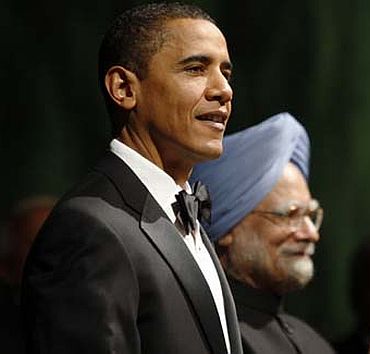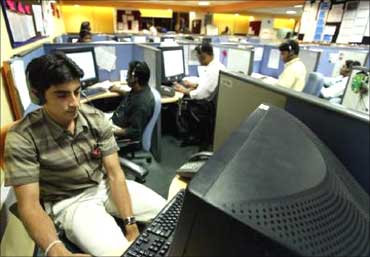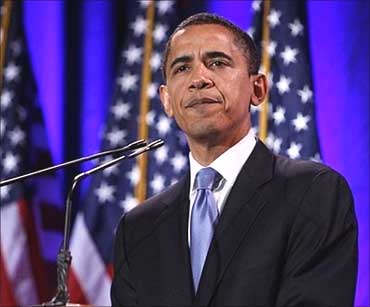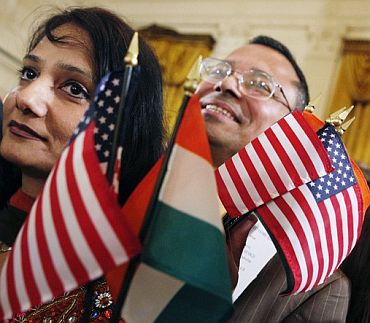Photographs: Reuters T N Ninan
It is not unknown for politicians to enter office with one set of assumptions, or worldview, and adopt an altogether different one shortly after assuming office.
The most recent example is Nick Clegg, the leader of the Liberal Democrats in Britain, who came into office earlier this year after signing a pledge that he would not raise university tuition fees; Mr Clegg now has to defend a trebling of those fees and wishes he had never signed that pledge.
The Obama presidency may not provide comparably dramatic about-turns, but can run it close.
During his campaign, and later, Mr Obama talked repeatedly of outsourcing, of the need to 'say no to Bangalore and yes to Buffalo'.
Indeed, he has signed into law Bills that raise taxes for US companies that indulge in outsourcing, and jacked up sharply H-1B visa fees; this second move affects Indian firms more than firms in any other country.
Now he says that an outsourcing-centric view of the Indian economy is a 'caricature', and outsourcing itself a 'bogey' that he has not raised.
. . .
Obama visit: Why it has been good for India
Image: Obama's volte face on outsoucring was intriguing.Photographs: Reuters
In his address to Parliament, he also said he would not take any steps that targeted Indian firms.
Consider also Mr Obama's campaign promise to focus on sorting out the Kashmir issue so that Pakistan would cooperate better in the Afghan war -- a linkage promoted assiduously by Islamabad and which New Delhi rejects.
When Mr Obama appointed Richard Holbrooke as a special envoy for 'AfPak', the initial attempt was to include Kashmir in Mr Holbrooke's brief. Now the US president is happy to leave the issue to be sorted out by India and Pakistan.
Indeed, during his summit-level talks in New Delhi, he is said to have never once mentioned the 'K' word.
A year ago, observers in India feared that Mr Obama was pushing for a 'G-2' world that would be dominated by the US and China; certainly, he raised Indian hackles by issuing a joint statement in Beijing that gave China a role in South Asia.
. . .
Obama visit: Why it has been good for India
Image: US President Barack Obama.Photographs: Reuters
Now he has signed a joint statement in New Delhi that encourages India to play not just an economic but also a strategic role in East Asia!
In his first year in office, the universal view was that the Obama presidency gave little importance to the Indian relationship. Yet, Mr Obama has now endorsed India's claim to a permanent Security Council seat, and given space and defence research organisations access to dual-use technologies.
He has also supported India's entry into all the technology-related supplier groupings. So he has given substance to his coinage that the Indo-US partnership is one of the 'defining' partnerships of the 21st century.
Consider, also, what Mr Obama said before he boarded his plane for Mumbai. He said that he intended to 'prise' open Indian markets.
Well, even though deals totalling $10 billion were announced on the first day of the visit, many of those deals were signed well before the president set out and had nothing to do with him; indeed, the biggest deal on the list (for military transport aircraft) is still being negotiated. So, no markets have been 'prised' open.
. . .
Obama visit: Why it has been good for India
Photographs: Reuters
One can debate why the US president has done about-turns on virtually all India-related issues.
Is it because his initial positions were not properly thought through?
Or because Indian diplomacy has been under-estimated?
Or, is it a sign of the relative decline of American power, so that Washington can no longer force its view on others?
Whatever the case, an Obama visit that few had pinned high hopes on has turned out to be surprisingly good for India. The task now is to build on the openings that the visit has provided.






article